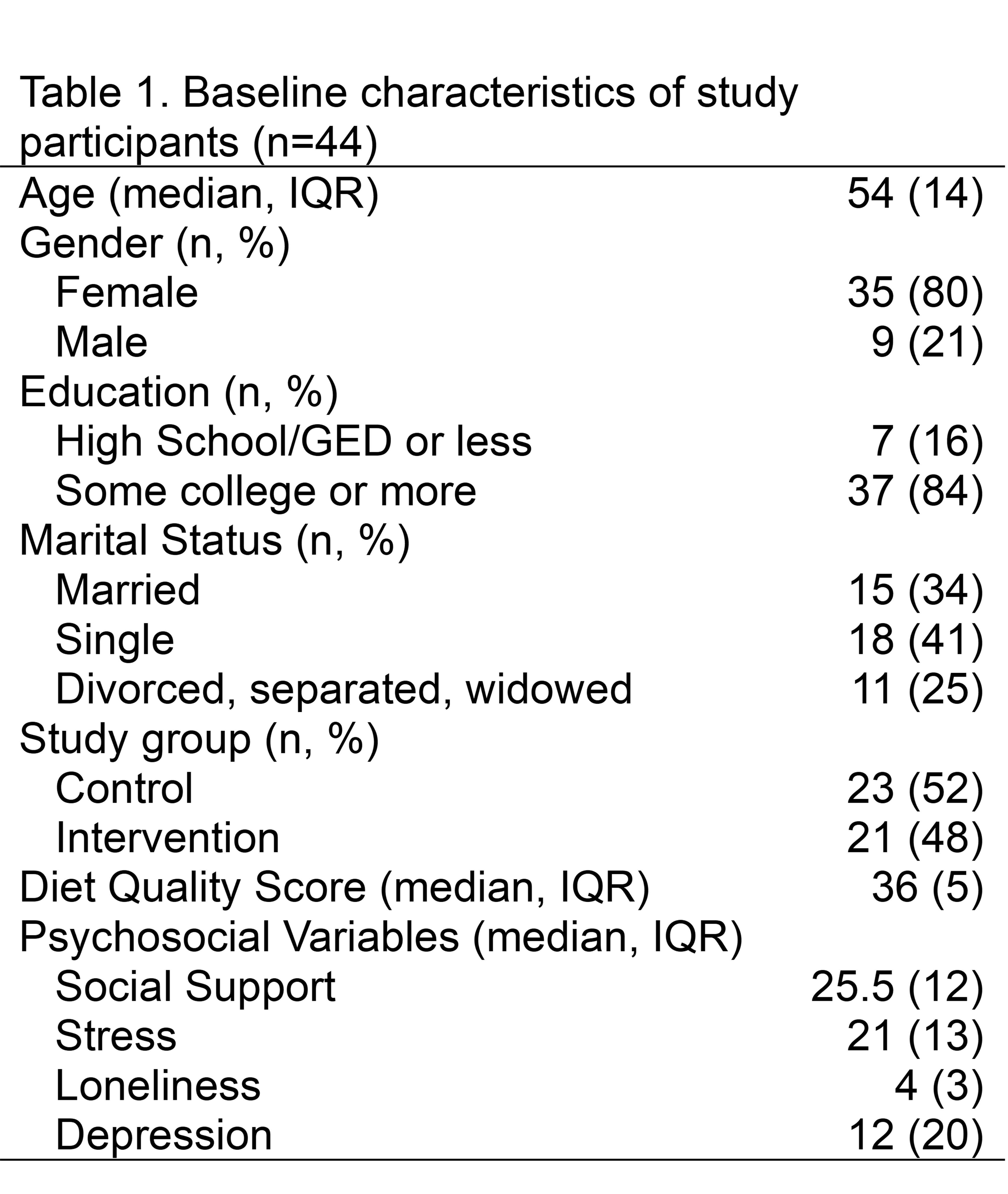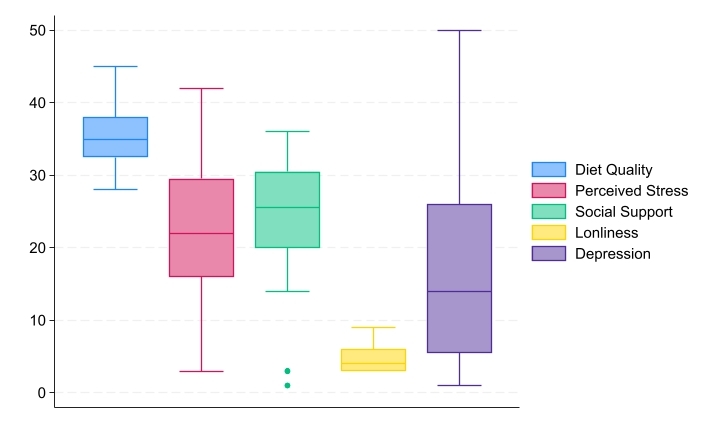Final ID: P3143
The Association of Psychosocial Factors with Diet Quality in a Puerto Rican Adults
Abstract Body: Healthy dietary patterns are important for cardiometabolic health. Psychosocial factors are also associated with health outcomes, with studies suggesting that poor psychosocial health is associated with low diet quality. Few studies have examined these associations in adults living in Puerto Rico. This study examines the cross-sectional association of psychosocial factors (depression, loneliness, stress, and social support) with diet quality.
This is a secondary analysis of a randomized pilot trial, the Puerto Rican Optimized Mediterranean-like Diet (PROMED), that examined the effect of a culturally appropriate Mediterranean-like diet on cardiometabolic health in a sample of adults with at least two cardiometabolic conditions living in Puerto Rico. Participants were randomized to an intervention or control group and completed 3 visits. Interviewer-administered questionnaires assessed perceived stress, depression, loneliness, and social support as well as a brief diet quality index. Responses were summarized into scores and examined as continuous variables.
Diet quality score was log-transformed to aid interpretation of model coefficients. Mixed effects models were used to estimate the association of each psychosocial factor with diet quality. A backwards stepwise method was applied to assess the contribution of each psychosocial factor within a single model; likelihood ratio tests evaluated model fit. Multivariable models controlled for age, gender, education, marital status, and study group.
Among 44 participants (94 observations, average 2 visits each), the mean age was 50.6 years (SD=9.5) and 80% were female (Table 1). Distribution of diet quality and psychosocial variables is shown in Figure 1. For every 1-unit increase in social support, diet quality increased by 0.35% (95% CI 0.02, 0.67), while every 1-unit increase in stress was associated with a 0.31% decrease in diet quality (95% CI -0.05, -0.56). Depression (-0.17%; 95% CI -0.35, 0.01) and loneliness (-1.34; 95% CI -2.78, 2.31) were also associated with decreases in diet quality, but these associations were not statistically significant (p>0.05). Backwards stepwise analysis identified stress as the main contributor to diet quality.
Stress and social support are key factors affecting diet quality among adults living in Puerto Rico. Interventions aimed at improving diet and cardiometabolic health should consider how psychosocial factors impact dietary behaviors and overall health outcomes.
This is a secondary analysis of a randomized pilot trial, the Puerto Rican Optimized Mediterranean-like Diet (PROMED), that examined the effect of a culturally appropriate Mediterranean-like diet on cardiometabolic health in a sample of adults with at least two cardiometabolic conditions living in Puerto Rico. Participants were randomized to an intervention or control group and completed 3 visits. Interviewer-administered questionnaires assessed perceived stress, depression, loneliness, and social support as well as a brief diet quality index. Responses were summarized into scores and examined as continuous variables.
Diet quality score was log-transformed to aid interpretation of model coefficients. Mixed effects models were used to estimate the association of each psychosocial factor with diet quality. A backwards stepwise method was applied to assess the contribution of each psychosocial factor within a single model; likelihood ratio tests evaluated model fit. Multivariable models controlled for age, gender, education, marital status, and study group.
Among 44 participants (94 observations, average 2 visits each), the mean age was 50.6 years (SD=9.5) and 80% were female (Table 1). Distribution of diet quality and psychosocial variables is shown in Figure 1. For every 1-unit increase in social support, diet quality increased by 0.35% (95% CI 0.02, 0.67), while every 1-unit increase in stress was associated with a 0.31% decrease in diet quality (95% CI -0.05, -0.56). Depression (-0.17%; 95% CI -0.35, 0.01) and loneliness (-1.34; 95% CI -2.78, 2.31) were also associated with decreases in diet quality, but these associations were not statistically significant (p>0.05). Backwards stepwise analysis identified stress as the main contributor to diet quality.
Stress and social support are key factors affecting diet quality among adults living in Puerto Rico. Interventions aimed at improving diet and cardiometabolic health should consider how psychosocial factors impact dietary behaviors and overall health outcomes.
More abstracts on this topic:
A Selective Agonist of the Beta 2 Retinoic Acid Receptor Reduces Necrosis, Lipid Peroxidation, and Oxidative Stress in Doxorubicin-induced Cardiotoxicity
Varzideh Fahimeh, Jankauskas Stanislovas, Kansakar Urna, Tang Xiao-han, Gudas Lorraine, Levi Roberto, Gambardella Jessica, Santulli Gaetano
CVSN Best Abstract Award: Longitudinal Associations of Childhood Maltreatment and Social Support with Sleep Duration Trajectories from Adolescence to AdulthoodSharma Yashika, Pardee Lisa, Redeker Nancy, Lopez Veneros David, Caceres Billy


